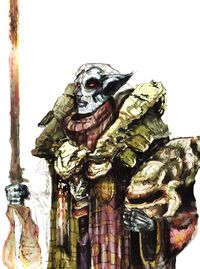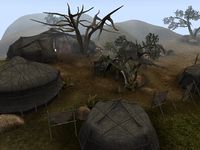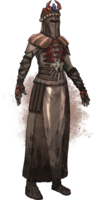Lore:Grisermantes
Os Grisermantes, também chamados Velothi em homenagem ao profeta Veloth, são nômades Dunmeri que tradicionalmente aclamam toda a região selvagem de Morrowind. Na Era Merética, Grisermantes e Dunmer eram muito parecidos e em pé de igualdade, mas desde o Primeiro Conselho e a ascensão das Grandes Casas, eles foram forçados a viver nas terras mais pobres e hostis. Eles viajam juntos de seus rebanhos, acampando onde for mais adequado. Recursos adicionais adquiridos pela tvida selvagem local são usados para fazer barracos, armaduras, vestuário e itens domiciliares. Cultura Grisermante é o resto da adoração ancestral da cultura tribal que os Dunmer "civilizados" deixaram para trás.
Diferente dos Dunmer assentados das Grandes Casas, eles não reconhecem o poder do Tribunal; em vez, eles acreditavam que o Tribunal traiu Lorde Nerevar na Batalha da Montanha Vermelha, e que eram mantidos vivos por meios mágicos que não eram necromancia. O desaparecimento do Tribunal e o desastroso Ano Vermelho de 4E 5 eventualmente levou outros Dunmer a abandonar a adoração ao Tribunal e a apreciar os Grisermantes por preservar sua tradição.
Cultura
De acordo com contagens do fim da Terceira Era, antes da sua reivindicação aos olhos dos Dunmer civilizados, os Grisermantes eram muito xenofóbicos, evitando estrangeiros, e eram conhecidos por serem agressivos a forasteiros. No entanto, se um estrangeiro faz um bom ato a um clã Grisermante, ele pode ser considerado Amigo-do-clã, e então adotado à tribo.
The Ashlanders of Vvardenfell are divided into four clans: the Ahemmusa tribe of the Azura's Coast region, the Erabenimsun tribe of the Molag Amur region, the Urshilaku tribe of the Ashlands and West Gash regions (strong believers in the Nerevarine Cult), and the Zainab tribe of the Grazelands region. They are often at odds with each other. There are also tribes living on the mainland, such as the Kagesh and Ulath of Stonefalls, the Vereansu of Deshaan, and the Mabrigash of the Vale of the Ghost Snake. Each clan is traditionally led by an Ashkhan, whereas the spiritual leadership lies with the Wise Woman. The secrets of the Wise Women are passed from one generation onto the other. Several prophecies, in the form of verses such as the Stranger, have survived throughout the years. Many others are believed to have been distorted or lost, but, as rumor will have it, the Dissident Priests may have recorded them and thus preserved them for posterity. The Wise Women of the Ashlander clans interpret dreams as prophecies, another major difference with the Tribunal Temple. All Ashlanders in a tribe, young and small, are born into the Ancestor cult of their clan; the Nerevarine Cult is a different, small cult with the Ashlander tradition.
If an Ashlander commits a crime against another member of a clan, he will be cast out of the clan. These outcasts have small camps in isolated areas; they often either become laborers in the mines or resort to banditry. Ashlanders in general are very proud, and they do not like to admit to things that shame them, especially the men; it is suspected that these tendencies may have contributed to their reputation amongst other Dunmer for being untrustworthy liars. Their internal culture is very polite, but they hate foreigners and have been known to be aggressive towards them (even though one of their own forgotten prophecies claimed the Nerevarine would be a foreigner).
Ashlanders think it shameful to attack unarmed persons, but they will kill without hesitation an armed person who offends them or their clan laws. Those who do not know their customs risk offending them just by speaking. Challenges for sport can be declined without shame, but not challenges for honor. Honor challenges come from perceived offenses or arise from customary formal challenges of status or ritual. Ashlanders may challenge a stranger who enters a yurt without invitation; customs differ with different tribes, but polite visitors who leave when requested may be forgiven. Gift-giving is particularly important in their culture. Among Ashlanders, a gift is a token of courtesy among strangers, and affection among friends. A thoughtful gift signals the giver is cautious, considerate, and aware of the receiver's wants and needs.
Quarta Era
Following the disastrous Red Year, widespread worship of the Tribunal ended. In its place the former Dissident Priests took full control of the Temple and sought to reinstate worship of the "Anticipations" (Azura, Mephala, and Boethiah) as the "New Temple". Fittingly, the daedra were dubbed the "Reclamations", as if they were reclaiming their status from the Tribunal. The rise of this New Temple almost completely vindicated the previously persecuted Ashlanders, who had persevered in worshipping in the three daedra for millennia. Amongst the Dunmer, the Ashlanders are lauded for having the "true vision" to keep true to the old ways. It is now quite common for many Dunmer to make the arduous pilgrimages into the ash wastes to seek the counsel of the Wise Women, who have done much to dispel Tribunal worship. They directly connect the eruption of the Red Mountain and the Argonian invasion to the anger of the three daedra.
Galeria
Veja Também
- Para informação específica do jogo, veja o artigo de Morrowind.
Livros
- As Antecipações
- Hinos Grisermos
- A Batalha da Montanha Vermelha de Vivec — The story of the Battle of Red Mountain and the Nerevarine Prophecies from Vivec's perspective
- Antes da Era dos Homens
- Os Alterados — História de como Boethiah refutou Trinimac
- Damyn Andrano, Hospedagem
- As Cinco Estrelas Distantes
- A Importância do Onde
- A Profecia Perdida
- Nerevar na Montanha Vermelha
- Nerevar Lua-e-Estrela
- Progresso de Verdade
- As Reclamações
- Palavras do Vento
- Lenda da Cobra Fantasma



